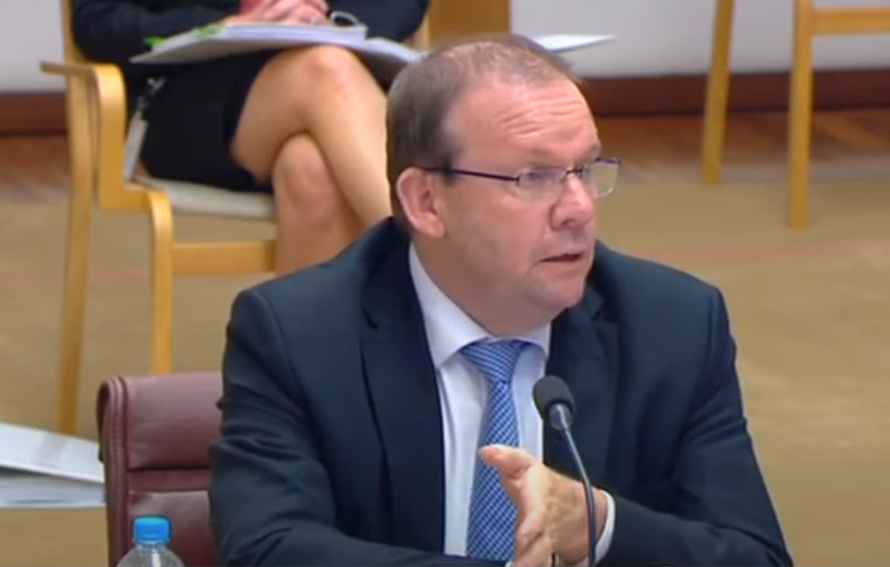
Auditor-General Grant Hehir has pointed to an integrity issue the APS needs to address. Photo: Screenshot.
Auditor-General Grant Hehir says the Australian Public Service has an integrity and accountability problem requiring dedicated effort to address.
In his Australian National Audit Office (ANAO) annual report, Mr Hehir pointed to numerous examples of public sector ethics being found wanting, not only in the failed Robodebt scheme but also through performance audits undertaken by his office.
Compliance with mandatory requirements, procurement and grants administration, and routine record-keeping offered stark examples of some agencies ignoring the rules and flouting the law.
“Upholding the ethical values of the public sector requires compliance with all relevant laws and acting in a way that is right and proper as well as technically and legally correct,” Mr Hehir wrote.
“Performance audits present strong evidence that public sector ethics, integrity and probity need to be a continuing focus.”
Ethical findings were explicitly raised in two audits in 2022–23: the administration of the Community Health and Hospitals Program and the Digital Transformation Agency’s procurement of ICT-related services.
But many other audits raised issues with the integrity of entity operations, particularly relating to non-compliance with mandatory requirements.
“In routine areas of public administration, such as meeting record-keeping requirements, performance consistently falls short,” the Auditor-General said.
“In the last five years, the ANAO has made negative comments on record-keeping in over 90 per cent of performance audit reports presented to the parliament.
“Likewise, procurement and grants administration are governed by legal requirements set out in the Commonwealth Procurement Rules and the Commonwealth Grants Rules and Guidelines.
“The procurement and grants frameworks are both established under the finance law and must be followed.
“Numerous findings of breaches of these well-established rules, or non-compliance with their intent, have been reported in performance audit reports.
“In some audit reports, the ANAO has identified — through these deficiencies — a failure to meet ethical requirements.”
The ANAO has increased its focus on ethics in recent years, revealing far too many shortfalls in integrity.
Over the past years, the Royal Commission into the Robodebt Scheme and the establishment of the National Anti-Corruption Commission have also kept the issue of public service integrity at the fore of the national discourse.
Mr Hehir has suggested the APS might have a cultural problem to address.
He delivered some sobering advice to agency bosses across the service.
“Not consistently meeting requirements raises questions of whether compliance with them, and their intent, is embedded as part of public sector culture,” he said.
“This presents challenges for leaders to ensure that they set a tone which promotes compliance with both the letter and intent of the law, along with an expectation that results are achieved.
“At present there appears to be a relatively high risk-tolerance for non-compliance so long as results are achieved, rather than seeing compliance as a hallmark of integrity and essential to the craft of public administration.
“Ensuring high levels of integrity may require a stronger approach to oversight of the sector.
“Setting principles-based rules and leaving their implementation to entity accountable authorities, without robust accountability, has not resulted in strong performance in the sector.”
The ANAO suggests public service leaders in charge of policy frameworks should take much stronger regulatory control, particularly in resource management, procurement, grants administration, cyber security, record-keeping, freedom of information and ethical conduct.
“A lack of change to this posture may indicate that stronger and more independent oversight functions are required, including with a clear mandate to serve the parliament,” the Auditor-General said.
He also noted that the ANAO’s enquiry work on behalf of the parliament was at times diminished by defensive responses in the sector, rather than responses that demonstrate a learning culture.
“Public sector performance is more likely to improve with a strong sense of accountability for adherence to the framework of rules and expectations under which the sector operates,” Mr Hehir said.
“This includes an openness to scrutiny, a willingness to admit mistakes and provide solutions, and providing access to information … A stronger focus on transparency and accountability — for example, with respect to the quality of performance information and responses to parliamentary recommendations and questions — would contribute to improved public sector performance.”
Original Article published by Chris Johnson on Riotact.











